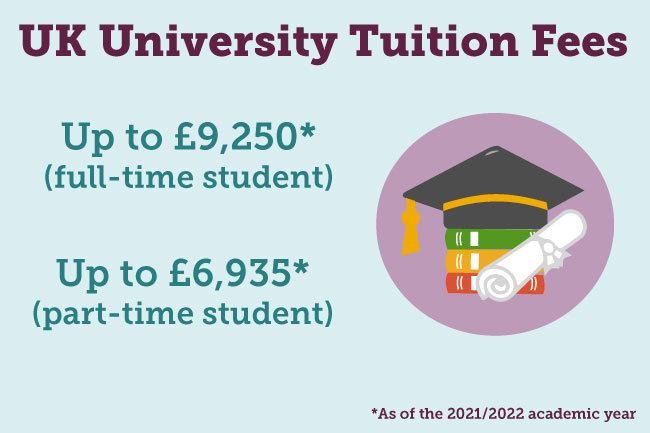
Guide to universities
Going to university to study towards a degree is an exciting prospect for your child. A record 43.9% of all UK 18-year-olds have applied for undergraduate courses for this academic year (2021/2022). That’s an increase from last year for the number of 18-year-olds leaving school to go into higher education!
With hundreds of thousands of students continuing to choose this path, your child needs more support than ever before from you as a parent. Some children may want to look into universities independently if they feel confident enough about starting this new journey.
But if they struggle with a certain aspect of the process, this will be the time when you as the parent can guide them through everything they need to know about applying for their courses by knowing the basic stages they will take in their application.
We have broken down all the steps you need to take to ensure your child has all the support for applying to university.
Stage One
Knowing study options – This may be the easiest or even the hardest part for your child. Try and find out where their interests lie based on what they currently study and what they potentially want to be when they’re older. Do they wish to be a teacher, a lawyer or an accountant? There are even many weird and wonderful courses available for your child to study in the UK, including Surf Science!
It’s important to guide them through the options they have available and know that they can also vary their degree however they like. They can choose to undertake a full-time course, part-time course or do distance learning. They may also want to study abroad or do a work placement year where they will be working for a whole year. If they decide to do one of these options, this will normally happen after they finish their second year. However, check the course details to see if any of these options are possible for your child.
Requesting the brochures – Your child will be able to request prospectuses from the universities' websites. They will be able to download them as a PDF or have them sent through the post – they have that nice brochure smell too!
Stage Two
University open days – Your child may really like the sound of a particular university from reading their website or brochures. However, they will get a better understanding of what life at university is like by attending an open day.
Most universities are offering virtual and/or on-campus open days. Please check the University’s website for more information.
It is advised that your child should try and get a taster for up to five universities, as they have five courses they can apply for in their UCAS application.
Visiting universities – If your child books an open day visit, ask if they would like you to come with them or not – you may also have to be their chauffeur! Universities normally post a schedule of talks taking place on the day for the different subject areas, so check which talk your child would like to listen to and allow plenty of time to get there.
Be sure to check the transport routes and, if you are driving, check to see if parking is available – your child will need to do the same if they are travelling alone. We would suggest that you have plenty of charge on your phone – or Sat Nav if driving – in case you get lost!
Setting up UCAS – Your child will apply for universities through the Universities and Colleges Admissions Service website – more commonly known as UCAS. On this website, they will be able to search and apply for universities and colleges in the UK. Your child’s school or college should support them with all the steps to take for making their online UCAS account. This information is also available on the UCAS website, for any other guidance your child may require.
Depending on what your child wishes to study and where they wish to study there are different UCAS deadlines to meet.
The main deadline to submit the UCAS application is in January. However, your child’s school may advise them to try and send off their application earlier to avoid disappointment. This is because places on the course get full early if many children have also applied.
If your child wants to apply to Oxbridge (Oxford or Cambridge) or wants to study Medicine, Veterinary Science or Dentistry, there is usually an earlier deadline which is normally in October. This is also the case for most dance, drama or musical theatre courses.
For more details on all the deadlines for your child, please refer to the UCAS website.
Helping with their personal statement – This is an important part of the UCAS application. For some children, this may be the first time they are writing a personal statement. We all know sometimes writing one of these when applying for jobs can be the most difficult part.
The personal statement is your child’s time to shine and convince universities to give them a place on their course! If they want to get an offer from their dream university, tell them to show enthusiasm in their personal statement and talk about any further research they have done, mention any relevant work experience, days out in museums and so on; to convince the admission tutors to give your child a place at their institution!
A teacher or your child’s head of year will also submit a reference with their UCAS application on behalf of their school or college.
You can find resources for help writing a personal statement here. UCAS also have their own writing toolkit on their website, which includes a personal statement mind map and worksheet.
Stage Three
Applying/attending interviews – Depending on the courses your child applies for, they may be invited for an interview, either online or face-to-face. Essentially this is like a job interview and depending on their chosen course, they could be required to bring in a portfolio of work. It is likely your child may still be required to demonstrate any work to support your assessment if asked by the university. For more information, please click here.
Offers and final choices – Once your child has sent off their UCAS application, universities will begin deciding whether to give your child an offer to study on their course. They may send your child a conditional offer which will be subject to your child getting the grades they need for their chosen course.
When your child has heard back from all five of their choices, they will need to decide which universities will be their firm and insurance choice. Their firm choice is their preferred course they wish to do and their insurance is their backup.
Student Finance – Once your child has decided on their final two choices, they will need to get their finances sorted, including perhaps getting a loan set up for their tuition fees and a maintenance loan and/or grant to help with living costs. The current tuition fees are listed below. Sorting out student finance can be a confusing and long process so it's important to do it as early as possible once your child has made their decision on their universities. For more information, visit the Student Finance website.

UCAS Extra – In the event that your child doesn’t receive any offers from their five chosen universities – or they do not accept any offers because they wish to study something else – your child is eligible to apply for a new course through UCAS Extra. This allows your child to apply for a new course they would prefer to study.
Taking exams – This is the last push for your child to get the grades they need for their chosen course. They are nearly there and will appreciate your continued support during the revision season.
Stage Four
Results Day – Your child’s nerves are now at their peak as Results Day has arrived! They will be able to find out if they get into their chosen university before collecting their A Level results (or Highers in Scotland) from their school or college by logging into UCAS Track. The website opens at 8.00am on Results Day and they will find out if they’ve been accepted into their chosen university.
However, your child could potentially find themselves not getting into their firm or insurance choice but they should not panic. UCAS will put them into Clearing, where your child can contact other institutions to see if they will let them study at their university based on their grades. Each year, record numbers of universities are adding their courses on the UCAS Clearing website, so students do not miss out on the chance to study a degree.
Once your child has received their exam results, they may have performed a lot better than they expected. These children have the option to find other courses asking for better grades by going onto UCAS Adjustment. If they find a course they are interested in, they can apply there and decline their previous offer.
Stage Five
The day your child is heading off to university is nearly here! Where did the time go? We have crafted an important checklist to follow in preparation for moving in day:
University Checklist
✔ Cutlery, pots and pans
✔ Documents (passports, student finance, accommodation information etc).
✔ Bedding (duvet, pillows, sheets, bedding, duvet and cover etc).
✔ Medication – (appropriate medicine your child needs to take, painkillers, vitamins, plasters etc.) They will also need to book their MenACWY vaccination too, which is a vaccine first-time university students should have to prevent cases of meningitis and blood poisoning.
✔ Stationery (pens, highlighters, post-its, notepads, pencil case, ruler, calculator etc).
✔ Books (on the reading list, books your child wants to read, books related to their subject area etc).
✔ Laptops, Kindles, tablets etc.
✔ Toiletries
✔ Some food to get them started!
✔ Make sure that they have a TV licence and internet connection if required
For more information to help your child apply for university, please visit the UCAS website.
Is your child ready for University?
As your child approaches age 18, they may need a helping hand to make their dreams of university possible. If they have a Child Trust Fund or Junior ISA with Foresters, find out how they can access their savings on their 18th birthday – visit our Matured Child Trust Fund or Matured Junior ISA page to find out more.




